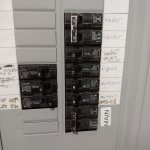- Joined
- Dec 7, 2012
- Messages
- 3,523
Had delivered yesterday a 12x30 shed. This will house my 1025, 316 a couple of ATVs and give me a nice work area.
I am wiring the shed and trying to do it right and pass code. In full transparency I have been trying to figure out what my local code is, but some of this stuff is a bit confusing to find. I'm no dummy to electrical but want to run this by some of you folks and see your thoughts.
My plans are a 100A panel in the shed that has 10-spaces. This is a pretty big panel but for future expansion potentially and just having a main shutoff, this is what I think I'd like. This will be fed by a 6/3 wire from a 50A breaker in the house's panel. Box will have a 100A main shutoff. Two 20A breakers, one circuit will be 7 perimeter 20A outlets on 12/2, other circuit will be 3 bench-area 20A outlets on 12/2. I always thought garages needed GFCI. I can put a GFCI as the first outlet in each circuit and that will protect plain-jane outlets, right? Or is that a code violation and I need GFCI at each outlet.
Last and third circuit will be 15A for lights. Porcelain sockets with 100amp LED bulbs. Also on this circuit I am thinking an outlet mounted higher up for a 4-6' LED shop light over my bench. Would that one outlet have to be GFCI? Or no?
All wiring is romex.
Looking forward to your thoughts. Thanks.
I am wiring the shed and trying to do it right and pass code. In full transparency I have been trying to figure out what my local code is, but some of this stuff is a bit confusing to find. I'm no dummy to electrical but want to run this by some of you folks and see your thoughts.
My plans are a 100A panel in the shed that has 10-spaces. This is a pretty big panel but for future expansion potentially and just having a main shutoff, this is what I think I'd like. This will be fed by a 6/3 wire from a 50A breaker in the house's panel. Box will have a 100A main shutoff. Two 20A breakers, one circuit will be 7 perimeter 20A outlets on 12/2, other circuit will be 3 bench-area 20A outlets on 12/2. I always thought garages needed GFCI. I can put a GFCI as the first outlet in each circuit and that will protect plain-jane outlets, right? Or is that a code violation and I need GFCI at each outlet.
Last and third circuit will be 15A for lights. Porcelain sockets with 100amp LED bulbs. Also on this circuit I am thinking an outlet mounted higher up for a 4-6' LED shop light over my bench. Would that one outlet have to be GFCI? Or no?
All wiring is romex.
Looking forward to your thoughts. Thanks.

